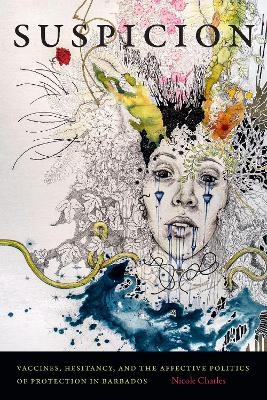
Suspicion
Vaccines, Hesitancy, and the Affective Politics of Protection in Barbados
Seiten
2022
Duke University Press (Verlag)
978-1-4780-1763-9 (ISBN)
Duke University Press (Verlag)
978-1-4780-1763-9 (ISBN)
Nicole Charles frames the refusal of Afro-Barbadians to immunize their daughters with the HPV vaccine as suspicion, showing that this suspicion is based in concrete histories of government mistrust and coercive medical practices on colonized peoples.
In 2014 Barbados introduced a vaccine to prevent certain strains of the human papillomavirus (HPV) and reduce the risk of cervical cancer in young women. Despite the disproportionate burden of cervical cancer in the Caribbean, many Afro-Barbadians chose not to immunize their daughters. In Suspicion, Nicole Charles reframes Afro-Barbadian vaccine refusal from a question of hesitancy to one of suspicion. Drawing on ethnographic fieldwork, black feminist theory, transnational feminist studies and science and technology studies, Charles foregrounds Afro-Barbadians' gut feelings and emotions and the lingering trauma of colonial and biopolitical violence. She shows that suspicion, far from being irrational, is a fraught and generative affective orientation grounded in concrete histories of mistrust of government and coercive medical practices foisted on colonized peoples. By contextualizing suspicion within these longer cultural and political histories, Charles troubles traditional narratives of vaccine hesitancy while offering new entry points into discussions on racialized biopolitics, neocolonialism, care, affect, and biomedicine across the Black diaspora.
Duke University Press Scholars of Color First Book Award recipient
In 2014 Barbados introduced a vaccine to prevent certain strains of the human papillomavirus (HPV) and reduce the risk of cervical cancer in young women. Despite the disproportionate burden of cervical cancer in the Caribbean, many Afro-Barbadians chose not to immunize their daughters. In Suspicion, Nicole Charles reframes Afro-Barbadian vaccine refusal from a question of hesitancy to one of suspicion. Drawing on ethnographic fieldwork, black feminist theory, transnational feminist studies and science and technology studies, Charles foregrounds Afro-Barbadians' gut feelings and emotions and the lingering trauma of colonial and biopolitical violence. She shows that suspicion, far from being irrational, is a fraught and generative affective orientation grounded in concrete histories of mistrust of government and coercive medical practices foisted on colonized peoples. By contextualizing suspicion within these longer cultural and political histories, Charles troubles traditional narratives of vaccine hesitancy while offering new entry points into discussions on racialized biopolitics, neocolonialism, care, affect, and biomedicine across the Black diaspora.
Duke University Press Scholars of Color First Book Award recipient
Nicole Charles is Assistant Professor of Women and Gender Studies in Culture and Media, University of Toronto, Mississauga.
Acknowledgments ix
Suspicion: An Introduction 1
1. Circles of Suspicion 24
2. Risk and Suspicion: An Archive of Surveillance and Racialized Biopolitics in Barbados 45
3. (Hyper)Sexuality, Respectability, and the Language of Suspicion 66
4. Care, Embodiment, and Sensed Protection 94
5. Suspicion and Certainty 115
Conclusion: Toward Radical Care 148
Notes 155
Bibliography 175
Index 191
| Erscheinungsdatum | 10.01.2022 |
|---|---|
| Zusatzinfo | 3 illustrations |
| Verlagsort | North Carolina |
| Sprache | englisch |
| Maße | 152 x 229 mm |
| Gewicht | 295 g |
| Themenwelt | Studium ► Querschnittsbereiche ► Infektiologie / Immunologie |
| Sozialwissenschaften ► Ethnologie | |
| Sozialwissenschaften ► Soziologie ► Gender Studies | |
| ISBN-10 | 1-4780-1763-5 / 1478017635 |
| ISBN-13 | 978-1-4780-1763-9 / 9781478017639 |
| Zustand | Neuware |
| Haben Sie eine Frage zum Produkt? |
Mehr entdecken
aus dem Bereich
aus dem Bereich
Buch | Softcover (2023)
Lehmanns Media (Verlag)
CHF 27,90


